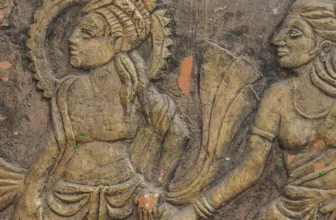
If you're just starting to explore Hindu philosophy, you may be wondering where to begin your journey into its profound teachings. Understanding the core principles often involves delving into foundational texts that offer deep insights into the nature of existence and spirituality. By diving into these ancient scriptures, you can uncover timeless wisdom that continues to guide individuals on their spiritual path. So, where should you start? Let's uncover the essential spiritual books that can illuminate the rich tapestry of Hindu philosophy and provide a solid foundation for your exploration.
Foundational Texts for Hindu Philosophy
If you're delving into Hindu philosophy, diving into the foundational texts is essential for a deep understanding. One of the most significant texts is the Vedas, a collection of ancient scriptures that form the basis of Hindu philosophy. These texts contain hymns, rituals, and philosophical teachings that delve into the nature of reality, the self, and the universe. Exploring the Vedas can provide you with profound insights into the core beliefs of Hinduism.
Another crucial text is the Upanishads, which are philosophical texts that explore the concepts of Brahman (the ultimate reality) and Atman (the self). The Upanishads delve into the nature of existence, consciousness, and the interconnectedness of all things. By studying the Upanishads, you can gain a deeper understanding of the spiritual principles that underpin Hindu philosophy.
In addition to the Vedas and Upanishads, the Bhagavad Gita is a seminal text that presents a dialogue between Prince Arjuna and Lord Krishna on the battlefield of Kurukshetra. This text delves into concepts of duty, righteousness, and the nature of reality, offering profound insights into the path of self-realization and spiritual growth. Engaging with these foundational texts is an essential step in exploring the rich tapestry of Hindu philosophy.
Introduction to Bhagavad Gita
Exploring the essence of the Bhagavad Gita provides profound insights into the dialogue between Prince Arjuna and Lord Krishna on the battlefield of Kurukshetra. This sacred text, part of the Indian epic Mahabharata, delves into philosophical concepts, ethical dilemmas, and the paths to spiritual enlightenment. The Bhagavad Gita, often referred to as the Gita, comprises 700 verses divided into 18 chapters and is considered a spiritual and philosophical guide.
As a beginner delving into Hindu philosophy, the Bhagavad Gita serves as a practical and relatable entry point. It addresses universal themes such as duty, righteousness, and the nature of reality, offering guidance on how to navigate life's challenges with wisdom and discernment. Through the teachings of Lord Krishna to Arjuna, readers are encouraged to reflect on their own actions, beliefs, and purpose in the world.
Exploring Upanishads for Beginners
Delve into the profound teachings of the Upanishads to embark on a journey of spiritual discovery and enlightenment. The Upanishads are ancient texts that form the philosophical basis of Hinduism, exploring profound concepts such as the nature of reality, the self, and the ultimate truth. As a beginner, you can start with the 'Mundaka Upanishad' and the 'Katha Upanishad,' which are relatively easier to grasp compared to others. These texts delve into the nature of the self, the importance of meditation, and the path to self-realization.
The Upanishads emphasize the importance of introspection, meditation, and contemplation to understand the deeper truths of existence. They offer profound insights into the nature of consciousness and the interconnectedness of all beings. By studying the Upanishads, you can gain a deeper understanding of the philosophical foundations of Hinduism and begin to explore your own spiritual journey. Take your time to reflect on the teachings, allowing them to guide you on a path towards self-discovery and enlightenment.
Essential Reading From Vedas
Discover the foundational wisdom of Hinduism by immersing yourself in the essential readings from the Vedas. The Vedas are the oldest sacred texts of Hinduism, composed in Sanskrit and revered for their spiritual insights.
To delve into the Vedas, start with the Rigveda, the oldest Veda, containing hymns dedicated to various deities and natural elements. Explore the Yajurveda, which provides instructions for rituals and ceremonies, emphasizing the importance of duty and action.
Delve into the Samaveda, a collection of melodies and chants used during rituals to invoke a divine presence. Lastly, engage with the Atharvaveda, which covers a wide range of topics including mantras for healing, rituals for prosperity, and reflections on the nature of existence.





